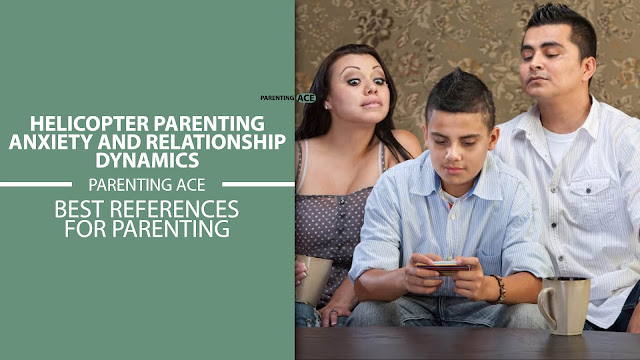The Intricate Relationship Between Anxiety and Helicopter Parenting
Exploring the intricate dance between anxiety and parenting, particularly the phenomenon known as helicopter parenting, unveils a compelling narrative of fear, control, and the quest for security. In this blog post, we embark on a journey to dissect the role anxiety plays in shaping parental behaviors, delving into how fears of harm and failure drive the tendency towards overinvolvement and excessive control. By unraveling the layers of this complex relationship, we gain insight into the nuanced dynamics of parent-child relationships and the profound impact of anxiety on both parties involved.
 |
| Helicopter Parenting: Anxiety And Relationship Dynamics |
What Role Does Anxiety Play In Helicopter Parenting?
In the realm of parenting, the term "helicopter parenting" has garnered significant attention in recent years. This phenomenon, characterized by overinvolvement and excessive control by parents in their children's lives, has been a subject of debate and scrutiny. One underlying factor often overlooked in discussions about helicopter parenting is anxiety. Understanding the role anxiety plays in this parenting style is crucial for unraveling its complexities and implications for both parents and children.
Anxiety's Influence on Helicopter Parenting
Anxiety serves as a driving force behind helicopter parenting tendencies. Parents experiencing heightened levels of anxiety often seek to alleviate their fears and uncertainties by exerting tight control over their children's lives. This control may manifest in various forms, such as constant supervision, micromanagement of activities, and overprotectiveness.
At its core, helicopter parenting stems from a deep-seated fear of harm or failure befalling one's child. Parents may worry excessively about their child's safety, academic performance, social interactions, and future success. These anxieties, if left unchecked, can compel parents to intervene excessively in their children's lives, hindering their autonomy and self-reliance.
Moreover, anxiety can distort parents' perceptions of risk, leading them to overestimate potential dangers and underestimate their child's ability to cope. This distorted perception fuels the need for constant monitoring and intervention, perpetuating the cycle of helicopter parenting. In essence, anxiety acts as a catalyst for hyper-vigilance and control, shaping the dynamics of parent-child relationships.
Impact on Children
The ramifications of helicopter parenting driven by anxiety are far-reaching and multifaceted. While parents may believe they are acting in their child's best interests, the consequences can be detrimental to the child's development. Excessive control and lack of autonomy deprive children of opportunities to learn essential life skills, make independent decisions, and develop resilience in the face of challenges.
Furthermore, constant parental oversight can impede the development of self-confidence and self-efficacy in children. When parents intervene at every obstacle or setback, children may internalize a sense of helplessness and dependency, undermining their sense of competence and agency.
Moreover, the pressure to meet parental expectations and fulfill predefined standards can exacerbate stress and anxiety in children. The fear of disappointing or displeasing their parents may lead to feelings of inadequacy and insecurity, perpetuating a cycle of anxiety and perfectionism.
In conclusion, anxiety plays a significant role in shaping helicopter parenting behaviors and dynamics within parent-child relationships. Parents driven by anxiety may resort to excessive control and overinvolvement as a means of assuaging their fears and uncertainties. However, this approach can have detrimental effects on children's autonomy, self-esteem, and overall well-being.
As counselors, psychiatrists, and psychologists specializing in family dynamics and developmental psychology, it is essential to recognize the interplay between anxiety and helicopter parenting. By addressing parents' underlying anxieties and providing guidance on fostering healthy parent-child relationships based on trust, communication, and gradual autonomy, we can support families in navigating the complexities of parenting with greater resilience and empathy.




